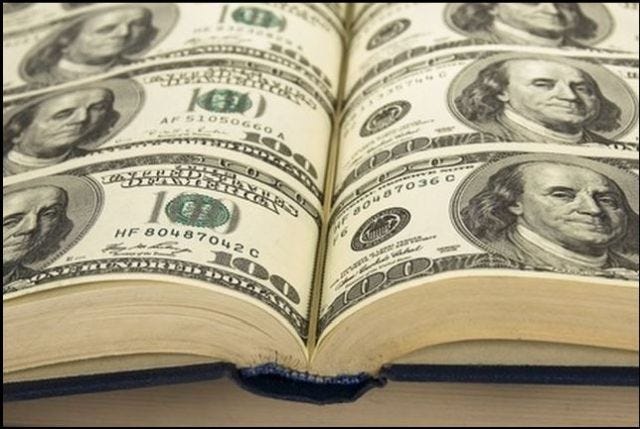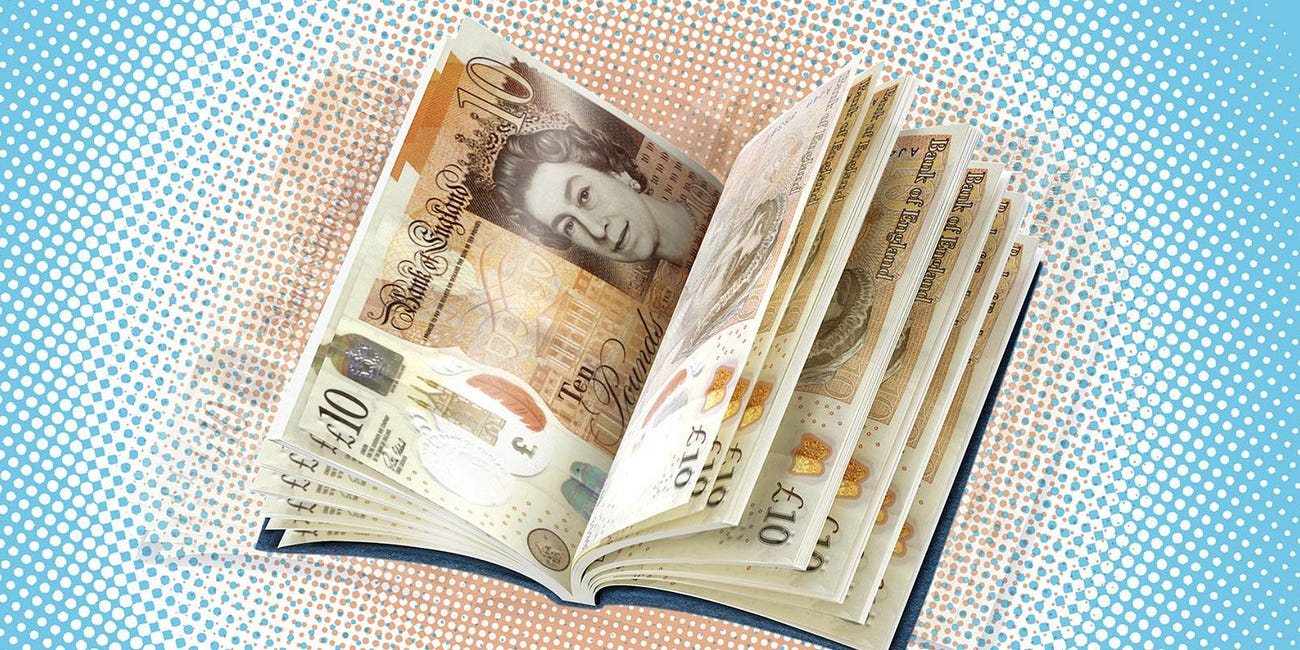How Much Do Ghostwriters Actually Earn?
For the female ones, not as much as their male counterparts, according to a new survey
Many people here on Substack are interested in writing or writing lives, and so I like to bring you a mix of this as well as my other content, and here is another post in what seems to have become a series of mine on what those in the publishing industry actually earn.
You can find previous posts that I have written about this here:
How Much Do Writers Actually Earn?
This week I received my royalty statement for Somebody I Used to Know, the first book that Wendy Mitchell and I wrote together.
And also here:
How Much Do Publishers Actually Earn?
A couple of weeks ago I published a post which attracted a fair bit of attention. It was entitled, How Much Do Writers Actually Earn? And it talked through royalty statements and how advances work, and also how much I earnt as a pop-up bookstore owner.
And today we turn our attention to what ghostwriters actually earn, and a survey that has recently been carried out by The Ghostwriters Agency. Yesterday The Bookseller (that’s the trade mag for those who don’t know), published the results of a survey carried out by The Ghostwriters Agency revealing a huge disparity between what female writers and male writers make through ghosting books.
They surveyed 51 bestselling ghostwriters, of which I was one, to find out how it is to make a living in this part of the publishing world. The agency found that on average male ghostwriters in the UK were being paid around £27,000 to ghostwrite a book as opposed to their female colleagues who were receiving an average of £13,800. These are fees that the publishers are paying, rather than what they are receiving for private jobs (more of that further down). It is interesting — and concerning to me — that major publishers who are desperate to create more parity in the industry commissioning minority voices, might also at the same time actively be discriminating between the sexes.
Here’s what Teena Lyons of The Ghostwriters Agency had to say about why there is this gender pay gap for ghostwriters: “Are men more bolshie? Do they only say they’ll do it for a set fee? The pay gap is something we need to talk about. But we also need to talk more about ghostwriting more full-stop… we’re a bit of a forgotten part of the industry.”
I think there are a few factors at work here, one of them being ‘hobby ghosts’ people who perhaps have other forms of income and so do this as a side gig, also people who have someone else paying the bills so they can afford to accept less, also the difficulty that women have in asking to be paid fairly and then people (in this case publishers) taking advantage of that.
I asked a male ghost friend of mine, Alexander Larman, about this inequity, was it really true that he was getting paid more than me for the same thing?
“The idea of a ghostwriter being paid decently is one for the birds, because no ghostwriter has ever been paid well because it’s not their name on the cover of the book,” he told me. “I’ve done three ghostwritten books now, the first one wasn’t paid for at all because I was young, I was naive and I was innocent and it was the kudos of having been involved in it that saw me through, and actually the only credit I ever got was a signed book and my name in the acknowledgements.
“My second ghostwritten book wasn’t exactly a ghostwriting project it was more high-end research and I was paid about £2,000-3,000 for that – it really wasn’t much money at all. The third one wasn’t so much a ghostwritten project but writing an entire book for somebody who wasn’t capable of writing, there was no input from her whatsoever, but I got paid more for that than for anything I’ve ever been paid including my own books that I write these days.
“But I don’t get any sense that I get paid more because I am a man, or any of the women around me being paid less, I think it’s a reflection of a lot of things, it’s a reflection of having a good agent, it’s also a reflection of the book you’re working on, and also how desperate people are, and therefore it will reflect on the book because if you’ve got the opportunity to take months and months and months to interview people you might come up with something quite different to if you have two months to produce a finished book.”
I think this last bit is what troubles me about publishers paying peanuts because they will, as a result, get a less decent book. I remember a few years ago Bloomsbury had paid a ghostwriter to write a book for one of their authors and when it was finished, it wasn’t up to their standards at all. They asked me if I could edit it, which I refused, though I did say I could rewrite it, which I did and delivered them exactly what they wanted. So basically what I’m saying is buy cheap and pay twice.
I have been ghostwriting for more than ten years now and what I have received in that time has fluctuated from low five figures to low six figures. Most of the time when I have ‘discovered’ an author and have then conceived the idea and style of a book for them (the hardest part I would say) and written the proposal, I’ve done this on spec because I knew there was a good book there. In those cases both the book deal and the royalties are split 50/50. The first book that Wendy Mitchell and I did together, Somebody I Used to Know, was a deal worth six figures both here and in the US, and we have almost paid back our UK advance — this is no mean feat.
If I’ve ghosted a public person, I’ve got a flat fee and no share of the royalties, and if I’ve ghosted a book for someone privately, I obviously negotiate my own fees and these are often more than publishers pay because I won’t be getting any of the royalties. I have to say I am horrified that Alexander wrote an entire book for £2,000-3,000, but I know plenty of people who are willing to do this. I don’t doubt the quality of his work (he has since written many brilliant books of his own, you can find out more about him here) but in general, I do think that not paying a ghost properly is going to get you an inferior product. Why would you do that? Why would you not want a ghost to survive properly while they write for you? If they have to do other work around your project, how could they possibly do your book justice?
I saw an article in the newspapers recently saying that Pan Macmillan were suing Russell Brand for £220,000 for not fulfilling his contract of writing two books for them. Firstly, it always horrifies me what publishers will pay celebrities for books (the deal in total was worth £575,000), but secondly, what also horrified me was that they paid a ghostwriter a paltry £3,000 to write the bloody thing for him and according to Pan Macmillan he refused to engage with the writer at all.
This is why I don’t write celebrity books and I have no interest in writing them.
Anyway, back to the survey by The Ghostwriters Agency, ghostwriters in the States are paid much more fairly for their work, ghostwriting over there is also not seen as an industry ‘dirty little secret’ like it is over in the UK. But the survey reported that in America the inequality between the sexes is actually switched, with female American ghosts being paid £100,000 by publishers compared to male ghosts on £55,000. Ghostwriters in the US also reportedly receive an average of £50,000 for private jobs.
So what is going on with British publishers? And why are they so intent on trying to get something for nothing?
Among those surveyed it turns out that 17% of bestselling ghostwriters on the agency’s books bring home £100,000 a year, while two percent earn just £10,000. The average earnings came out at £33,500 per annum with a mix of private and publisher paid work.
And so, make of that what you will. I know there is a lot of interest from people in becoming a ghostwriter and I still think that you can earn a fair wage (or even whack) from the profession which is why I’ve been busy in the last few months putting together a sixteen-week course on how to become a ghostwriter which I’ll tell you more about soon. But I think the best advice I can give someone, and one that I’ve always sworn by myself throughout my entire 30-year writing career, is to work smart as well as hard. The best chance you have of making a decent living from ghostwriting is to find your own projects and bring them to publishers, and that is also the most exciting type of work, finding things you really care about, writing books that go out there and change the world. I still love my job, I would just like to see people being paid fairly to do it.
Also my other advice is find your niche, I’ve always ghosted books by strong female voices and activists in their field. My stable is writing books that start conversations. I think it’s good to stick to a portfolio so people know what you do and what you’re good at. But there is also plenty of room for people to move into the industry, publishers always need more books, more good ideas, and ones that are well written.
Just make sure you get paid fairly for it, especially if you’re a woman working in the UK it seems.
• I’d love to know what you think, is ghostwriting an industry that you have considered? Is it a string you would like to add to your bow?
This is a free post but a lot of my work is behind the paywall, so do consider upgrading to become a paid subscriber which would give you so much more access including coming along to my monthly creative meets — the next one is on Sunday, April 6th
…








I love that we have some transparency on this now. Thanks for sharing, Anna. It will perhaps help women in the UK set better prices and close the gap.
This is fascinating. I had no idea of the range of fees - and that Russell Brand example! For God’s sake!!!